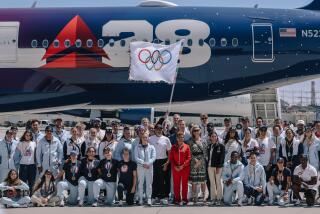Pre-L.A. Marathon bike race canceled amid city crackdown
- Share via
For four years, thousands of cyclists have come to Los Angeles for the biggest underground bicycle race in the country, a 4 a.m. sprint along the empty L.A. Marathon route that turns darkened streets into a rushing whir of gears and blinking lights.
This year, however, the city has clamped down. Officials threatened to fine or arrest the organizer, Don Ward, if he holds the ride.
Ward announced Tuesday night he was canceling the event, telling riders on Facebook that the city informed him he did not have proper permits.
But some cyclists, still remembering the heart-racing thrill of their first marathon rides, are vowing to take to the street anyway.
“They’re public streets, and we can be out on them at any time,” said Erick Huerta, 29, of Boyle Heights, who has participated every year. He said he and 20 to 25 other cyclists from the Eastside would ride Sunday, and he expected several hundred others to join them.
The unexpected roadblock for one of the city’s most popular cycling events comes as the underground biking movement emerges as a powerful force in Los Angeles. Guerrilla bicycling groups like Wolfpack Hustle and the Midnight Ridazz count thousands of members and are vocal supporters of city policies that favor cyclists, including a growing network of bike lanes.
Part street race, part theater, the Marathon Crash Race gives some of Los Angeles’ most daring and experienced cyclists a chance to compete for bragging rights and a coveted set of Wolfpack Hustle dog tags. For the less competitive cyclists who follow behind at a more staid pace, the event is a rare chance to zip freely down some of L.A.’s most famous boulevards without a car in sight.
Until now, city officials allowed the event to go on without a permit. But this year, several agencies — including the city attorney’s office and the Los Angeles Police Department — decided a permit was necessary because of public safety concerns.
“Nobody wants someone to get hurt,” said LAPD Cmdr. Bill Scott, who supervises the marathon route. “There is a tremendous amount of danger involved in any bicycle race, even when you have street closures.”
Not all intersections are fully closed off before the runners start, Scott said, so cyclists run the risk of crashing into early morning drivers. He added that some cyclists run red lights and stop signs.
Without permits, Scott said, the LAPD can’t know how many people will be riding, or how many officers will be needed. In some cases, he said, the person seeking the permits ends up shouldering some costs for street closures or overtime for city staff.
Ward said he didn’t know the city was requiring a permit until this week. Once he learned of this, he said, he sent an email to the Bureau of Street Services. He said he’s received no response. The city said it has not received a formal application for the permit.
“I’m not sure why everything fell apart the way it did,” said Ward, who leads Wolfpack Hustle. “I guess the city just decided this year to bring the hammer down.”
Until now, the cyclists and the LAPD have shared a good relationship. Organizers have praised the LAPD for supporting the ride and driving alongside cyclists to help prevent collisions. This year, for the first time, cyclists had the option of taking out insurance policies to cover up to $10,000 in medical expenses.
“This is them bringing something that was below ground and trying to make it aboveground,” said Eric Bruins, the planning and policy director of the Los Angeles County Bicycle Coalition. “They’re basically being punished for trying to do it right.”
For more than a decade, the organizers of the Los Angeles Marathon held an early morning, noncompetitive bicycle race before the footrace. That was canceled in 2009. Wolfpack Hustle started the Marathon Crash Race the same year.
Last year, more than 2,000 people gathered outside a Silver Lake doughnut shop at 3 a.m., some wearing sleek spandex, others in hats and wings. This year, registrations flooded in from as far away as England, China and the United Arab Emirates, Ward said.
“It’s definitely a huge bummer, especially seeing the progression of how far this race has come,” said Scott Piercefield, 26, who said he no longer plans to race Sunday. “I think it was going to happen sooner or later, that it was going to get too big.”
The race is one of the L.A. events most anticipated by cyclists, along with CicLAvia, the car-free gatherings that close down major boulevards for pedestrians and cyclists. Each of those events costs more than $300,000, including salaries for officers who staff the road closures.
Ward said he believed a permit for the Marathon Crash Race could cost more than $100,000. Right now, competitive cyclists pay $20 to register, though many amateurs join in without registering. The race receives some corporate sponsorship, including from Red Bull.
Raising the entrance fee to cover the permit, he said, would prevent younger cyclists from experiencing the race with older and more experienced riders.
“It’s just not meant for weekend warrior roadies,” Ward said.
“It’s meant for youngsters who are not necessarily the most privileged people.”
Asked to explain how the Police Department will approach cyclists who insist on riding, Scott of the LAPD said officers will wait to see what happens.
Times staff writer Ari Bloomekatz contributed to this report.
More to Read
Sign up for Essential California
The most important California stories and recommendations in your inbox every morning.
You may occasionally receive promotional content from the Los Angeles Times.












